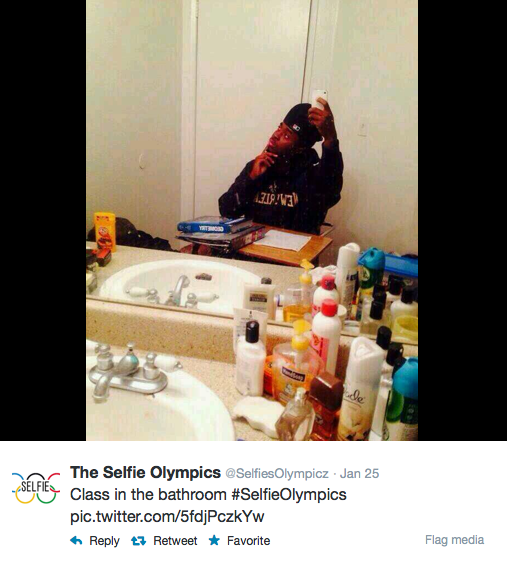Back in January, there emerged a trend for taking selfies with an unusual or complex subject matter. Such images were shared and gathered together under the title Selfie Olympics. This trend follows on from other photography-based displays of physical or creative prowess, such as planking or extreme ironing. What interests me about the Selfie Olympics, however, is what it adds to the discourse of selfies, and photography more generally.
Firstly, using the notion of ‘the Olympics’ connotes competitive ways of defining and limiting photographic activities. A number of comments about the Selfie Olympics identify certain images as ‘having won’, suggesting that people can ‘stop taking selfies now’ (interestingly, the Ellen Oscar selfie was discussed similarly, as if it represented some sort of apex which would signified an end point). Selfie-taking is therefore a practice with a limited time-frame and a conclusion, through which a hierarchy of excellence is established, and which then negates the need for further activity.
Secondly, the Selfie Olympics displays an extraordinary amount of creativity, in which subjects balance on door handles, arrange complex sets and go to considerable lengths to make their images both amusing and impressive. 
Others even put themselves in danger, such as @inhalecj:
This creativity (and bravery) of the Selfie Olympians is understood as being special in relation to ‘normal’ selfie-taking. The Olympic selfie which makes its subject look funny or ridiculous, yet also conveys their adept manipulation of cultural tropes, performs two functions: it enables them to present themselves socially to generate peer esteem and enable self-reflection (arguably the purpose of most selfies), but does so in a way that protects the subject from typical selfie criticism (narcissistic, boring, samey etc etc) by virtue of being unusual or amusing (image below by @mykittygobang).
And here lies the ‘problem’ with selfies – the Selfie Olympics images are perceived to be giving something to the audience, whereas ‘normal’ selfies are seen in comparison as too personal, and therefore ‘giving’ nothing to anyone other than the subject. This demand, for the audience to be ‘given’ something, demonstrates that to see an example of self-involvement we need not look at selfie-takers, but their critics. Because the selfie is of no interest to them, the image is dismissed.
Thirdly, the Selfie Olympics, as well as acting divisively in the ways suggested above, also problematises the notion of selfies or selfie-takers being a homogenous group. This is important for my thesis, as I am arguing against the reduction of certain photographic practices to certain meanings and functions. The idea that the selfie ‘is’ something or other is a way of defining and limiting those who take them. Here, we can see that a range of purposes and identities, from the political and culturally-savvy, to the surrea (image below by @imgeezus).
But of course, a lot of these subjects are mocking selfies at the same time as taking them, ridiculing the prevalent bathroom pictures and hand gestures by taking them to an extreme. This connects with my wider argument of social media providing a context for distinguishing oneself through mocking others. The Selfie Olympics is therefore a striking example of photographic practice being used to comment on itself (image below by @djgetbizzy).






